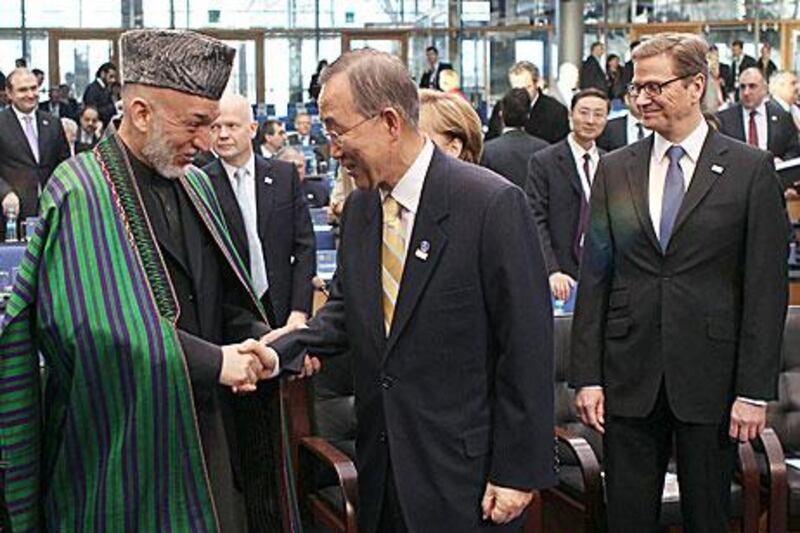BONN, GERMANY // An international conference yesterday on the future of Afghanistan was overshadowed by a public display of bad blood between the United States and Pakistan, the two nations with the greatest stake and say in making Afghanistan safe and solvent.
Pakistan boycotted the conference in the German city of Bonn at which some 100 nations and international organisations, including the United Nations, pledged political and financial support to ensure Afghanistan's stability after international troops leave the country in 2014.
Islamabad decided not to attend the conference to protest an apparently errant US air raid last month that killed 24 Pakistani soldiers along the border with Afghanistan. The strike enhanced the perception in Pakistan that Nato and the US were its true enemies, not the Taliban militants who operate on both sides of the border.
"It was unfortunate that they did not participate," said Hillary Clinton, the US secretary of state. "I expect that Pakistan will be involved going forward and we expect them to play a constructive role."
Pakistan has been seen as instrumental to ending the insurgency in Afghanistan because of its links to militant groups and its unwillingness, from the US and Nato perspective, to drive insurgents from safe havens on its soil where they regroup and rearm.
Germany and the US had once hoped the conference would showcase progress towards a political settlement between Afghanistan and the Taliban-led insurgency that 10 years of fighting by international forces has failed to dislodge. Instead, it became a status report on halting progress on other fronts and a glaring reminder that neither the Taliban nor Pakistan was ready to sign up to the international agenda for Afghanistan.
Participating nations were to pledge their support for an inclusive Afghan-led reconciliation process on condition that any outcome must reject violence, terrorism and endorse the Afghan constitution and its guarantee of human rights.
Yousuf Raza Gilani, the Pakistani president, said that his country was committed to working with Afghanistan to bring insurgent leaders into talks with the government.
The US has sought an agreement with the Afghan government establishing operating rules for the small number of remaining US forces and other issues after international forces withdraw.
Afghanistan's fragile government presented a sobering view of its long-term financial dependence and promised fiscal reforms along with a renewed crackdown on corruption. The country will need international handouts for years after most foreign forces - currently totalling about 130,000 international troops - leave Afghanistan in 2014.
"Together we have spent blood and treasure in fighting terrorism," sais the Afghan president Hamid Karzai. "Your continued solidarity, your commitment and support will be crucial so that we can consolidate our gains and continue to address the challenges that remain. We will need your steadfast support for at least another decade," Karzai added, echoing an assessment by the World Bank.
Donor nations did not commit to specific figures at the one-day session yesterday, but pledged that economic and other advances in Afghanistan since the removal of the Taliban government in 2001 should be safeguarded with continued funding. A donor conference will be held in July in Japan. Despite more than a decade of international intervention, Afghanistan still ranks among the world's poorest and most corrupt nations in the world.





